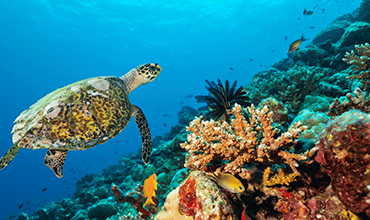Day: 22th February, 2023 | Wednesday
7:00 pm – 7:30 pm IST | Click here for time in your location
Venue: Stein Auditorium, India Habitat Centre, Lodhi Road, New Delhi
Background

Humanity’s well-being is intertwined with the health of the ocean. The ocean covers more than 70% of the surface of the planet and form 95% of the biosphere (WOA 2021). According to the World Ocean Assessment, the ocean is Earth’s largest ecosystem, regulating global climate and driving weather-related systems. Extremely crucial for ‘blue carbon’, which refers to carbon captured by the world’s ocean and coastal ecosystems, including mangroves, sea grasses, and salt marshes, the ocean is also responsible for about 50% of the oxygen produced in Planet Earth. By absorbing heat and approximately 25% of the additional carbon generated by human activities (IPCC 2019), the ocean mitigates the negative consequences of climate change. With sea level rise, ocean acidification and loss in oxygen levels, which is essential for life, the ocean is increasingly threatened (IPCC 2019). Conservation and sustainable use of the seas are crucial for attaining social, environmental, and economic goals and hence, for sustainable development. Supporting the Blue Economy and safeguarding the ocean for future generations, sustainable and integrated ocean management is key.
The parties to the UN Convention on Biodiversity recently committed to the effective conservation and management of at least 30% of the world’s lands, inland waters, coastal areas, and ocean, while the members of High-Level Panel for a Sustainable Ocean Economy have committed to sustainably manage 100% of ocean areas under their national jurisdiction by 2025, guided by Sustainable Ocean Plans. This shows the importance world leaders attach to sustainable ocean management.
Goal 14 of the SDGs is dedicated to ocean, seas, and marine resources. The SDGs framework provides the basis for governments and development agencies around the world to improve their policies and policy implementation regarding marine related activities. The current ocean governance frameworks do not currently integrate the challenges of climate change, and the integration of land–sea interactions is weak. Ocean innovations need to consider marine ecosystems as a whole and promote adoption of ecosystem-based approaches, marine spatial planning, strategic environmental assessments, and integrate traditional knowledge about marine ecosystems from local communities. Without effective integrated management actions that can address the range of challenges, the ocean will fail to provide its full potential of goods and services to the planet and humanity. Therefore, to release this potential for supporting the Blue Economy and safeguarding the ocean for future generations, sustainable and integrated ocean management is key.
There is also a need to strengthen implementation by building capacity at all levels, including the international, regional, national, and sub-national levels, and in coastal communities. The United Nations Convention on the Law of the Sea (UNCLOS) offers minimal guidance on climate change. Existing agreements under the United Nations Framework Convention on Climate Change and other Rio Conventions lack a mandate for the high seas. There is a need for a strengthened ocean-climate interface (TERI 2022). A shared vision and common understanding for ocean governance, which is based on agreed scientific approaches and criteria, is essential to fill in ocean governance gaps.
About the Session
Through a new type of mutually beneficial North-South cooperation, government officials and scientists from India and Norway are working together to enhance integrated ocean management through Marine Spatial Planning. Through two pilot projects in Puducherry and Lakshadweep, the Government of India is making strides to ensure that marine and coastal resource use is planned in an integrated manner, balancing economic, social and environmental considerations.
The objective of this session is to examine some of the innovations linked to ocean which include marine spatial planning and how it can contribute towards addressing the triple planetary crisis of climate change, pollution and biodiversity loss
Key Questions(speakers are requested to address all/at least two questions)
[1] How and why is Government of India enhancing Integrated Ocean Management? What will Puducherry and Lakshadweep gain from the pilot Marine Spatial Plans?
[2] What is Norway’s experience with using Marine Spatial Plans for sustainable ocean management and how do the plans help address the triple planetary crisis of climate change, pollution and biodiversity loss?
[3] What are the Government of India’s plans to scale the use of Marine Spatial Plans to improve ocean management?
[4] What will be India’s and Norway’s role in furthering integrated ocean management regionally and internationally in the future?
[5] How is India planning on taking forwards the sustainable ocean agenda during its G20 presidency?
Format
The session will involve a fireside chat discussion, which will start with brief remarks by the moderator followed by inputs by two speakers, one from a research perspective and one from a policy perspective. Strict time management is to be followed, for which there will be a timer/ buzzer.
References
IPCC (Intergovernmental Panel on Climate Change). 2019. Special Report: Special Report on the Ocean and Cryosphere in a Changing Climate [Online]. Intergovernmental Panel on Climate Change.
WOA (World Ocean Assessment). 2021. The Second World Ocean Assessment. World Ocean Assessment II, Volume I. New York.
TERI (The Energy and Resources Institute). 2022. Ocean-Climate Interface: Implications for Global Commons based Climate Action, COP27 Compass, Act4Earth and World Sustainable Development Summit, New Delhi: The Energy and Resources Institute.
